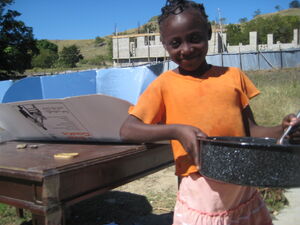Tom Sponheim (talk | contribs) mNo edit summary |
Tom Sponheim (talk | contribs) mNo edit summary |
||
| Line 402: | Line 402: | ||
* [http://www.rd.com/make-it-matter-make-a-difference/make-it-matter-helping-refugees-in-darfur/article109459.html Reader's Digest] has awarded a $10,000 grant to [[Jewish World Watch]] for its landmark [[Iridimi Refugee Camp|Solar Cooker Project]]. |
* [http://www.rd.com/make-it-matter-make-a-difference/make-it-matter-helping-refugees-in-darfur/article109459.html Reader's Digest] has awarded a $10,000 grant to [[Jewish World Watch]] for its landmark [[Iridimi Refugee Camp|Solar Cooker Project]]. |
||
| − | |||
| − | ==December 2008== |
||
| − | * [http://65.108.108.197/catalog/alternativegiftcard-p-30.html Donate to Solar Cookers International] in the name of a loved one, friend or associate. They receive a card and a subscription to the Solar Cooker Review. |
||
| − | |||
| − | *[http://www.rd.com/make-it-matter-make-a-difference/make-it-matter-helping-refugees-in-darfur/article109459.html Make it Matter: Helping Refugees in Darfur] - ''Reader's Digest'' |
||
| − | |||
| − | ==November 2008== |
||
| − | [[Image:Greg_Menke_and_Dave_Flanders_November_2008.jpg|thumb|right|200px|Dave Flanders, left, and Greg Menke have warmed up to the idea of cooking with a solar-powered oven. - Daniel Brock (West Hawaii Today)]] |
||
| − | * After reading a magazine article that said more fruit on the Big Island is wasted than eaten or sold, Greg Menke had an idea. "We were thinking of the cheapest thing we could come up with, and we ultimately came to bananas," Menke said. The result, an oven that can hold up to 120 loaves of banana bread at a time. "We're looking to partner with coffee shops and other organic producers," Menke said, adding that its likely Kona residents will see the solar oven at the farmers market and area stores in the near future. Menke and Flanders also share some high-minded intentions for their oven. "We'd like to help feed the homeless," Menke said. "We hope people will chip in and donate. We don't need charcoal or wood -- just a sunny day." [http://www.westhawaiitoday.com/articles/2008/11/24/local/local02.txt More info...] |
||
| − | |||
| − | *[[Rachel Andres]] of [[Jewish World Watch]] reports, "We have just started manufacturing and training women in our 3rd camp, the [[Oure Cassoni Refuge Camp]] which houses 28,000 refugees." Read the [http://laist.com/2008/11/25/laist_interview_rachel_andres_of_th.php full text of the interview with Rachel Andres]. |
||
| − | |||
| − | *The Senegalese Ministry of Biofuels and Renewable Energy is entering into an agreement with [[Solar Household Energy]] to produce and sell solar cookers locally. "We hope to make solar stoves available in all 11 regions of Senegal," said [[Abdoulaye Touré]], solar energy specialist at the ministry. [http://www.alertnet.org/thenews/newsdesk/IRIN/96374cdb5bba5f4ea06fe20d2a405919.htm More information...] |
||
| − | |||
| − | *[[Jimmy McGilligan]], Manager of [[Barli Development Institute for Rural Women]] originally from Northern Ireland received his medal, OBE an honour bestowed by Her Majesty Queen Elizabeth II of the United Kingdom at Windsor Castle during an investiture ceremony on November 11. “For his services to social causes and the use of alternative energy in rural communities in India”, is the recognition of his dedicated service to the rural and tribal women in central India. [http://www.mynews.in/fullstory.aspx?storyid=12604 More information...] |
||
| − | |||
| − | *The OPEC Fund for International Development has published [http://www.ofid.org/publications/PDF/NL/NL_14_3.pdf an extensive article] about Dr. [[Robert Metcalf]]'s work water testing and pasteurization in Africa.<br><br> |
||
| − | |||
| − | [[Image:Global_Resource_Alliance_outside-_Kenya_-_October_2008.jpg|right|400px]] |
||
| − | * The [[Global Resource Alliance]] recently organized a workshop in the Lake Victoria region of [[Tanzania]]. The workshop was lead by [[Solar Cookers International East Africa Office]]. [[John Amayo]] was the main teacher. It went really well. There are now small groups in several villages that want to begin building solar ovens and selling them. The sale price is about ten dollars each and the stoves can save end users over $15 per month on charcoal – not to mention preventing deforestation, eliminating deadly indoor smoke and providing nutritious meals with very little attention required. The workshop included delicious solar cooked meals. |
||
| − | |||
| − | [[Image:Girl_Guides_Association_of_Malaysia_-_Glorious_sunshine.JPG|400px|right]] |
||
| − | *[[Joyce Ong Choon Kim]] reports: Anyway I would like to say that as we are approaching the end of 2008, I am glad to note that efforts in promoting solar cooking in [[Malaysia]] is very encouraging. The Cadet Guides Branch of the [[Girl Guides Association of Malaysia]] has been advocating the benefits and fun of solar cooking in its training courses and camps. As a lecturer and Cadet Guides Commissioner under the Ministry of Education, I am very happy to have been actively involved in many of the programs implemented this year be it at institut, zone or national level. As the members in our branch are basically are teacher trainers and student teachers, it is hoped that they will continue to practice and advocate solar cooking to their students and society at large. Here's a brief recap of some of our activities: To celebrate the Year of the Cadet Guides 2008, we brought solar cooking to the orang asli (natives) villagers in Kampung Teluk Tongkah on 22 April 2008. We gave a talk and demonstration as the weather was not favourable for cooking. 270 Cadet Guides and 50 Guiders from the 27 teacher training institute in Malaysia participated in this celebration which was launched at this village. The 353 Cadet Guides from the central zone, who attended the Young Leaders' Course for Cadet Guides course were given a hand-ons session on solar cooking. The course was held from 12 - 15 May 2008 in Morib, Selangor Darul Ehsan. From 20 - 26 June 2008, a jamboree was held by the Teacher Education Division, Ministry of Education for all the uniformed units (Scouts, Cadet Guides, Red Crescent, and others), A total of 1485 student teachers attended the camp. There was much interest and amazement when the Cadet Guides unit did a session on solar cooking. The weather was just glorious for solar cooking. The 46 new lecturers in charge of the Cadet Guides all over Malaysia were given a workshop on solar cooking when they attended the Pre Warrant Training Course in Kuala Lumpur from 16 - 19 September 2008. The response was very good and they collaborated actively to produce some cookers to take back. Sixteen Cadet Guides from the Federal Institut of Teacher Training enjoyed two days of solar cooking when they attended the Basic Camping Course in Bukit Mertajam together with other student teachers from the various uniformed units. Finally I must say that I really do enjoy solar cooking (plus advocating it) and it's all thanks to [[Barby Pulliam]]. |
||
| − | |||
| − | ==October 2008== |
||
| − | [[Image:Lunda_Lalondi_Vicente_-_Cartoon_1.jpg|300px|right]] |
||
| − | *Cartoon by [[Zimbabwe]] refugee [[Lunda Lalondi Vincente]] (on the right) |
||
| − | |||
| − | ==September 2008== |
||
| − | * [[Fatima Jibrell]], co-producer and writer of the film [http://www.charcoaltraffic.com Charcoal Traffic], and co-founder of [[Sun Fire Cooking]] has been awarded the prestigious 2008 National Geographic Society/Buffett Award for Conservation in Africa, for her many years of struggle against the illicit charcoal trade which is destroying the fragile semi-arid [[Somalia|Somali]] environment and the pastoral way of life. |
||
| − | |||
| − | *Google's Project 10<sup>100</sup> (pronounced "Project 10 to the 100th") is a call for ideas to change the world by helping as many people as possible. Here's how to join in. |
||
| − | |||
| − | #Send Google your idea by October 20th. Simply fill out the submission form giving Google the gist of your idea. You can supplement your proposal with a 30-second video. |
||
| − | #Voting on ideas begins on January 27th. Google will post a selection of one hundred ideas and ask you, the public, to choose twenty semi-finalists. Then an advisory board will select up to five final ideas. |
||
| − | #Google will help bring these ideas to life. They're committing $10 million to implement these projects, and their goal is to help as many people as possible. So remember, money may provide a jumpstart, but the idea is the thing. Good luck, and may those who help the most win. [http://www.project10tothe100.com/index.html More information...] |
||
| − | |||
| − | [[Image:Water_testing_kit2.jpg|thumb|right|300px|The complete [[Portable Microbiology Laboratory]] with all of its components]] |
||
| − | *[[Karyn Ellis]] reports on how use of the [[Portable Microbiology Laboratory]] (PML) helped Kenyan health officials control a recent Cholera outbreak: "With close to a full house thanks efforts made by the [[Solar Cookers International East Africa Office]] and [[Bob Metcalf]], twenty representatives from various districts of Ministry of Health (MOH) & Water Resources Management Authority (WRMA) were in attendance as Bob deftly executed an informative full two days of lecture on PML water testing and hands-on methodology. There had been an outbreak of Cholera a few weeks before our [[Karyn_Ellis#Summer_2008|Safe Water Workshop]], and MOH and WRMA health workers were able to contain the outbreak utilizing the PML to test water in the rural Nyakach region near Lake Victoria. This is a strong testimony to our cause, and such an encouraging step for such an influential government organization to be using the PML officially in their work, where not even a year ago they had no resources of this kind. What a monumental opportunity for the governments of Kenya to demonstrate the practicality and effectiveness of the PML in life threatening situations, and one that will pave the way for implementation in other countries." Read [http://www.solarcookers.org/news/2008/09/intl-development-east-africa-trip-june.html a report of Karyn's recent project work in East Africa]. |
||
| − | |||
| − | * New NGO added: [[Blue Ventures Carbon Offset]] is working in [[Madagascar]] and [[South Africa]]. |
||
| − | |||
| − | *New resource: [http://www.solarcookers.org/programs/advocacy_packet.pdf Adovacy handouts provided for your use by Solar Cookers International] |
||
| − | |||
| − | *[http://www.voanews.com/specialenglish/2008-09-06-voa2.cfm Cooking Meals With the Sun] - ''Voice of America broadcast'' |
||
| − | |||
| − | ==August 2008== |
||
| − | [[Image:Sunny_Cooker_-_LSA_1.jpg|220px|right]] |
||
| − | *'''New plans:''' In early 2008, [[Teong Tan]] set a goal to create a functional solar cooker, from a flat sheet of cardboard, by using 25% less material than that required for a [[CooKit]] solar cooker. The end result, after about eight month's time, is the '''[[Sunny Cooker]]'''. The Sunny Cooker, made from a 36" x 36" sheet of cardboard, has multiple triangular shape reflector panels to help focus sunlight towards a cooking pot. It is designed in such a way that its contour can be easily re-shaped, simply by tilting the cooker forward or backward. Altering the contour of the cooker would enable the cooker to become more efficient in capturing the sunlight at different sun angles. |
||
| − | |||
| − | [[Image:SCI_Denver1.jpg|200px|right]][[Image:SCI_Denver2.jpg|right|200px]] |
||
| − | *[[Susan Corbett]] writes, " A few pictures from the New Energy Station at the '''Democratic National Convention''' in Denver. We had about 10 ovens, perfect weather for solar cooking and lots and lots of people. The SunEdison aprons were donated from a local company along with the cookie dough. I wore my [[Solar Cookers International]] T- shirt and the yellow SCI hat from [[Kenya]] that [[Bob Metcalf]] sent to me. Patty and I talked a lot about SCI. [[Barbara Stribling]] (the one in the blue cowboy hat), one of SCI's early founders, also came to help. We had about 6-8 volunteers every day from 10am to 4pm. SCI provided water and snacks for the volunteers and will be picking up some of the food demo costs. The first Sunday was by far the most crowded with well over a thousand people. The rest of the week, we had several hundred a day go by. Lots and lots and lots of SCI cards, brochures, and newsletters were given away." |
||
| − | |||
| − | *[[Solar Cookers International]] is seeking experienced solar cooks to conduct solar cooking demonstrations in communities across the U.S. as part of the '''ASES National Solar Tour''' the largest solar energy event in the world. Saturday, October 4, 2008. [[Media:Solar_Tour_Info1.pdf|More information]] |
||
| − | |||
| − | [[Image:McDonald_Ganisyeje3.JPG|thumb|right|400px|All the 28 ladies were given a [[Cookit]] each, a heat resistant plastic bag and a black pot.]][[Image:McDonald_Ganisyeje2.JPG|right|250px]] |
||
| − | *[[McDonald Ganisyeje]] reports: "I just had a successful solar cookers workshop at Chapananga area in Chikwawa District, a community surrounding Majete Game Reserve. This was organised through Africa Parks who are managing the Game Reserve. I trained three women trainers and 5 Africa Parks Extension staff on the first day. The following day 28 women turned up for the training, and five AP Extension staff including [[Stella Mzumara]] - Africa Parks Extension Co-ordinator. The three ladies, Trainers- Beauty, Beatrice and Selina did a wonderful demonstration of their capabilities to teach and explain some of the issues about solar cooking to the other group of women. The response was very good. Chikwawa District is one of the hottest areas in [[Malawi]], lying along the great rift valley also known as "the lower shire". Sunshine is plenty, which is good for solar cooking. We boiled tea, cooked vegetables, eggs were well boiled (even cracked), and the sweet potatoes well cooked. The rice and beans were the only dishes that didn't cook very well. Rice because of inadequate water was added and the beans needed more than 4 hours. That was a good lesson for the women! All the 28 ladies were given a Cookit each, a heat resistant plastic bag and a black pot which were painted during the workshop. During the training I was assisted by [[Justin Namizinga]], based in Blantyre, is one of the trainers I trained some time back and he is doing a great job! More follow up workshops will be conducted up to December." |
||
| − | |||
| − | *The [http://solarcooking.org/newsletters/scraug08.htm August 2008 issue of Solar Cooker Review] is now online |
||
| − | |||
| − | ==July 2008== |
||
| − | *[[Solar Cooker Web Site Contest]]. Win up to $300. |
||
| − | *[http://www.time.com/time/world/article/0,8599,1820844,00.html India's Temples Go Green] - ''Time Magazine'' |
||
| − | *[[Vietnam Solar Serve]]'s [http://solarcooking.org/SolarServe/SolarServeNewsNo19.pdf July 2008 newsletter] is now online |
||
| − | *Google uses a solar cooking theme in its release of its [http://googlewebmastercentral.blogspot.com/2008/06/get-cooking-with-webmaster-tools-api.html Webmaster Tools API] |
||
| − | *[http://www.radionetherlands.nl/currentaffairs/region/africa/080619-solar-oven Radio Netherlands broadcasts a piece] about [[Marie-Rose Neloum]]'s work with [[Iridimi Refugee Camp|Darfur refugees]] in [[Chad]]. |
||
| − | *[[Solar Cookers International]] was [http://www.solarcookers.org/news/2008/06/sci-honored-by-sac-state-university.html recently honored] by the Center for African Peace and Conflict Resolution at California State University Sacramento for bringing the benefits of solar cooking and [[water pasteurization]] to more than 30,000 African families. |
||
| − | *[[Margaret Koshoni]] reports from [[Nigeria]] on her [[Cosmopolitan Women Club|recent lecture/demonstration]] where the rented hall that seats 250 overflowed with more than 450 interested participants. |
||
| − | *New video: [http://www.jewishworldwatch.org/refugeerelief/womenofiridimi.html The Women of Iridimi] shows how refugee women have built solar cookers for all 5000 families in the [[Iridimi Refugee Camp]] in [[Chad]]. |
||
| − | *New newsletter: [http://solarcooking.org/newsletters/suNews/SunewsJan-June08.pdf suNews] from the [[Solar Cookers International East Africa Office]] |
||
| − | *[http://solarcooking.org/SCI-Annual-Report-2007.htm Solar Cookers International's Annual Report for 2007] is now online |
||
| − | *[[Alex Kee]] wins [http://database.energyglobe.info/listProjects.aspx?id=9156 National Energy Globe Award for Malaysia] |
||
| − | *[http://www.guardianweekly.co.uk/?page=editorial&id=577&catID=7 Rays of hope for the Darfur refugees] - ''The Guardian Weekly (UK)'' |
||
| − | *[http://web.worldbank.org/WBSITE/EXTERNAL/NEWS/0,,contentMDK:21594049~pagePK:64257043~piPK:437376~theSitePK:4607,00.html World Bank audio interview] with [[Margaret Owino]] |
||
| − | *[http://energyseeds.com/2008/04/15/arnold-schwarzenegger-tastes-solar-cooking-“fabulous”/ Arnold Schwarzenegger Tastes Solar Cooking: "Fabulous!"] |
||
| − | *[http://www.youtube.com/watch?v=69FXae8DOlU YouTube video] of low-tech [[tracking]] device for solar cookers |
||
==Older news== |
==Older news== |
||
*[[The Solar Cooking Archive Wiki|Current news]] |
*[[The Solar Cooking Archive Wiki|Current news]] |
||
| + | *[[Solar cooking news archive 2008|2008]] |
||
*[http://solarcooking.org/news.htm Older news]. |
*[http://solarcooking.org/news.htm Older news]. |
||
Revision as of 02:09, 2 June 2011
For current news, go to the Main page.
January 2011
- Indian government clears plan for sixty solar cities - The Indian Government will kick off an ambitious scheme to develop sixty solar cities in two years. It will be done in collaboration with city corporations, municipalities and district councils. The focus will be on renewable energy devices such as kitchen waste-based plants, solar water heating systems, solar cooking systems, solar steam generation, drying and air heating systems, solar air-conditioning, bio-mass gasification based systems and biogas. Read more...
- U.S. Department of State awards $100,000 grant to Turkish foundation - The grant will allow the Foundation for the Support of Women’s Work (FSWW) to launch a year-long solar cooking project. The project will have two phases. During the first phase, educational seminars about the effects of climate change are planned in several communities — Istanbul, the Marmara district of Bandırma, the southern province of Hatay and the southeastern province of Mardin. Renewable energy sources will be discussed as alternatives to smokey cooking fires. An estimated 2,000 solar cookers will be built and sold by women’s groups during the second phase of the project, providing needed income opportunities. Read more...
- Flood-affected Pakistanis receive solar generators and cookers -- The people of Swat, Pakistan have received solar-powered energy generators for electricity and solar-powered cooking equipment funded by a leading Berlin-based non-governmental organization, German Aid for Afghan Children (GAAC). The organization has begun one million Euros relief and reconstruction work in the Khyber Pakhtunhwa's districts worst hit by floods. GAAC had announced in 2010 the distribution of solar-powered lithium-ion batteries to generate electricity and solar cooking equipment for the planned 1000 families of Swat, Nowshera, Pabbi and Bannu districts. Read more...
350px|right
- ID Cook offers Portable snap-together parabolic solar cooker - Based in France, ID Cook markets the Cookup200. A clever design, it is assembled quickly from notched pieces that fit together without fasteners. When disassembled, it is easily transported in a relatively compact travel bag. Typically this style of cooker is constructed with fairly heavy materials, and a single piece reflector. Parabolic cookers are often used at a single location. This video of the lightweight solar cooker demonstrates its assembly, operation, and portability.
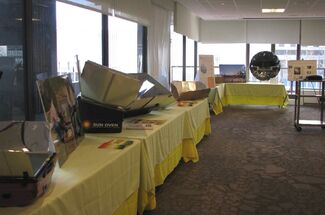
Solar Cookers International exhibition at the UN.
- Solar Cookers International exhibition and reception at the Untied Nations a success - Representatives from non-governmental organizations and interested supporters attended the three-hour, open-house event put on by Solar Cookers International on January 18th. The concept of solar cooking is so important, that representatives from Nigeria, the Middle East, Pakistan, Bangladesh, and Somalia made it through freezing, blowing rain to attend the exhibition. A wide variety of solar cookers were on display with informational material accompanying the cookers. Video loops played throughout the evening, showing real people around the world cooking with the sun and training others to do so. There was a real urgency at the exhibition that the message of solar cooking be strong, unified, and be present in global discussions of development and progress for people around the world.
- African solar cooking partnership project visited by Dr. Jill Biden, wife of the U.S. Vice President - Lift Up Africa is a strong believer that partnering and sharing resources is a key to successful implementation and sustainability. This project was designed to introduce solar cooking and related technologies to ten communities in Kenya. The partnership relied on Africa HEART, a Kenyan-based NGO recently visited by Vice President Biden’s wife Dr. Jill Biden, to identify three community groups in each district, the fifty trainees in each community, and training venues. Africa HEART covered expenses and handling logistics related to transport for the solar cooking equipment, distribution venues, and follow-up on usage and other needs. Solar Cookers International East Africa Office (SCI-EA) provided the trainers and supplies, written reports, and conducted the training. Lift Up Africa provided a grant to cover direct expenses related to equipment purchase and SCI-EA’s travel, partnership connections, and worked with Africa HEART on follow-up and project evaluation. This project was a success and 150 families, approximately 1,200 people, have benefited from their new training and solar cooking equipment. This project demonstrates the value of independent organizations working together, each providing their area of expertise, to achieve substantial results. Hopefully, this will be a continuing pattern for projects initiated by members of the Solar Cookers World Network.
- Haiti - One year later - Haiti continues to benefit from solar cooking. Solar Cookers International (SCI) and International Child Care Ministries (ICCM) are working to expand a project in the schools around Port Au Prince to integrate solar cooking into the 5th grade science curriculum. The goal is that each student will receive a CooKit to use each day in preparing and cooking their lunch, all the time learning about science. Training and certification of teachers continues, as do SCI’s efforts to secure funding to provide 2000 more CooKits for this school project. To date, SCI has provided 200 CooKits, pots and Water Pasteurization Indicators (WAPIs) for four schools. With your help, we will achieve our goal of 2000 more! Reaching students in their classrooms, teaching a new lifestyle habit, while at the same time providing environment education is a winning program. Background: SCI, in collaboration with Sun Ovens International and ICCM, distributed over 400 CooKits in Haiti immediately following the devastating earthquake there. Near the community of Pigeon, 135 Haitians were trained in solar cooking by Programme Energie Solaire. Each participant received a CooKit, a pot and a WAPI, giving these earthquake survivors a method to cook their food and pasteurize their water without need of scarce and expensive fuel. Solar cooking is technology that offers relief in disaster situations: 1) When infrastructures are in ruins and no energy or gas is available, solar cooking utilizes the sun to cook hot food; 2) When fuel is scarce, cooking with the sun offers a clean, workable solution; 3) Solar cookers fight cholera by heating water to pasteurization temperatures (65°C or 150°F); and 4) Using a solar cooker requires only the sun, and does not necessitate searching for other forms of fuel. Families can stay together and remain safe. SCI thanks you for your ongoing support for solar cooking in Haiti.
December 2010

India's richest temple, Tirumala Tirupati Devasthanam, uses a solar-powered Scheffler Community Kitchen to feed tens of thousands of people every day.
- Institutional solar cooking gains momentum in India - A news release from the Ministry of New and Renewable Energy in India, reporting on important activities in 2010, states: Solar concentrating systems, comprising automatically tracked of parabolic dishes, have been found to be useful for generating steam to cook food for hundreds and thousands of people in community kitchens especially at religious places such as Shirdi, Mount Abu, Tirupati etc. The world’s largest system is functioning at Shirdi for cooking food for 20,000 people/day. These systems have found good applications for air conditioning and laundry also and a few demonstration plants have recently been installed. A total of around 80 concentrating systems of different capacities covering 25,000 sq.m. of dish area are functioning in the country, largely for cooking purpose. During 2010, 15 such systems were sanctioned covering a dish area of around 3000 sq.m. See Scheffler Community Kitchen.
- The Solar Cookers World Network needs to be heard from. In September U.S. Secretary of State Hillary Rodham Clinton announced the new Global Alliance for Clean Cookstoves, that hopes to raise more than $250 million to help create “a thriving global market for clean and efficient household cooking solutions” benefiting 100 million homes by 2020. She spoke of the urgency to find alternative solutions to open-fire, and dirty-stove cooking. A solar cooker is quite obviously a clean cookstove. Hundreds of millions of poor people live where the sun provides free energy for cooking and water pasteurization. They live where forests have been decimated for use as cooking fuel. Solar cooking is part of the solution. Fuel-efficient stoves do reduce the use of wood, dung, and charcoal and are part of the ongoing solution in partnership with solar cooking and heat-retention cooking. Solar Cookers World Network needs to mobilize to raise a unified voice advocating solar cooking. Solar Cookers International (SCI) and Solar Household Energy (SHE) will coordinate a collective, strategic response and welcome members’ assistance. The SCWNet has quietly grown to include about one-half of the world’s experts and active promoters of solar cookers and solar food processors. In addition to the above task, our goal for 2011 is to recruit the other half to double SCWNet’s response capacity for opportunities like the Global Alliance for Clean Cookstoves. More details and information on participating.
- Solar Cookers International's newsletter published - The November 2010 issue of Solar Cooker Review, Solar Cookers International's newsletter, is now online.
thumb|400px|right
- Get Beyond Firewood - A recent video produced by the Womens Refugee Commission is a poignant reminder that the need to get past using firewood as a cooking fuel is great, and immediate. Limited forested areas are being depleted, and the smoke from cooking fires is causing respiratory illness. Also, sadly, women living in distressed areas are putting their lives on the line, facing possible assualt when they leave their homes in search for fuel to simply be able to cook for their families. However, solar cooking has begun to be an important part of the solution. Investigate work being done in refugee camps.

Copenhagen Solar Cooker Light preparing a meal.
- The search for simple, sturdy, easy-to-use solar cookers - The Copenhagen Solar Cooker Light, designed by Sharon Clausson, is a compact, inexpensive solar panel cooker made from durable, reflective vinyl panels. The panels bolt to a base plate, and clip to each other to create the panel cooker shape. Disassembly is quick, and the cooker conveniently packs flat for easy transport. The designer states that the curved shape of the cooker is more stable than typical panel cookers in windy conditions.
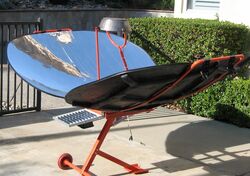
Climate Healers butterfly-style parabolic solar cooker with attached photovoltaic cell phone charger.
- Solar cookers and cell phones working together - Climate Healers is a non-profit corporation based in California, USA, that has been formed to combat the climate crisis. Reforestation is a major part of their work. They also work to slow further deforestation in areas where the demand is high for wood and charcoal used for cooking. Initial projects have begun in India. They see solar cooking as an important alternative cooking method to help save remaining forests. When introducing solar cooking to new areas, recruiting local residents to become trainers and mentors for the community has historically been a successful strategy. Climate Healers, however, has taken the innovative approach by creating an incentive based system incorporating cell phone use. Their solution is to provide solar cookers with integrated charging stations, along with cell phones and LED lights at no cost to members of the community. The cell phones are configured to measure the usage of the cookers as they get charged, and then rewards are issued in the form of cell phone talk time proportional to the usage.
November 2010

Chef José Andrés Listen to a recent interview.
- Celebrity chef helps in Haiti - This past year José Andrés, an internationally known chef and social activist, has been doing his part to help the people of Haiti. When he had lost power at his own home for a few days, following a severe snowstorm, he discovered the magic of solar cooking. He was amazed how efficiently a parabolic solar cooker, which had been given to him and had sat unused, performed on a cold but cloudless day. In spring 2010 he was part of a team from Solar For Hope, which headed to Haiti to help with earthquake relief. As part of their efforts they distributed parabolic solar cookers and provided training. He feels the parabolic cooker is well-suited to prepare the traditional local fried food recipes. Andrés believes a pressurized cook pot is also a valuable asset to promote with solar cooking. It can shorten cooking times, and provide additional cooking, once the pot is removed from the oven. Listen to a recent interview with José about the project. Inspired by his initial experience in Haiti, José created the World Central Kitchen, a foundation focused on feeding vulnerable people, supporting the local agricultural economy through local food purchases, and promoting nutritious foods, recipes, and environmentally sustainable cooking fuels and technologies. José is returning to Haiti, and the World Central Kitchen, in partnership with Grameen Creative Lab, is planning to build a commercial kitchen with the capacity to feed 10,000 people daily. The goal is to create a sustainable "social business" for the people that have the least. They plan to serve a nearby orphanage, school, hospital, and local residents. Solar cookers will be play a central role in the project.
- The photos are in! As part of a 350.org project titled "eARTh BIG Pictures - Climate Art Visible from Space," the Canary Project and local Cape Town, South Africa citizens created an enormous solar sun out of 70 parabolic solar cookers with the “rays” being on-the-ground tables where the local community will feast on traditional food made in the solar cookers. The solar cookers will be donated to the Khayelitsha community of Cape Town where many people do not have access to electricity. Each cooker lasts for 10 years and requires no fossil fuels, saving money for families while also protecting their health and the environment. Watch a video of the event.
- Clean Currents, a mid-Atlantic states provider of wind power through the electric grid, announced it is partnering with Solar Cookers International for its annual holiday giving campaign. From now through January 12, 2011, which is the one-year anniversary of Haiti’s devastating earthquake, they will donate a portion of proceeds from every residential wind power enrollment to the purchase and distribution of solar cookers in Port-Au-Prince, Haiti. According to the Pan American Health Organization (PAHO), only 12% of Haiti's population had piped, treated water before the earthquake, and now the situation is worse. Access to pasteurized drinking water is the most effective deterrent to cholera, which is spreading quickly throughout Port-Au-Prince’s slums and displaced persons camps. Solar cookers are an effective way to provide water safe for drinking, off-grid, and without fuel other than abundant sunshine.
- Cooking your food with the sun in South Africa, November 27th, 2010 Imagine if you used the sun to cook your food instead of using the electricity or gas? Well, in the sunny balmy climate of Cape Town, South Africa they are doing just that! On November 27, 2010, 1,000 people will sit down for a meal together that will be cooked exclusively with solar cookers. But before the community sits down to feast they will engage in an intergalactic photo shoot. They will create the adjacent image out of the solar cookers and will have a 59 second window where the design will be photographed from a passing satellite. People all over the world are joining this event in South Africa by donating $150 to buy a large solar cooker for this event as way to help find a permanent solution to carbon reduction in the Khayelitsha neighborhood of Cape Town. More information... - 350.org
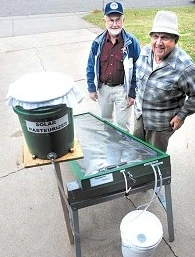
Bob Nepper and Bill Stevenson with their water pasteurizer
- Retired 3M engineers create a solar water pasteurizer for use in Third World countries. Inspired by the potential capacity for heat transfer they saw in plastic political signs, Bob Nepper and Bill Stevenson, long time members of the Solar Oven Society in Minnesota, USA, set about designing their version of a water purifier. Water is first filtered, then passes through a field of channels in a black corrugated plastic collector. When the water reaches 71°C (160°F), and is suitable for drinking, a thermostat will open and allow the potable water to flow into an adjacent bucket. Capacity for the system is approximately four gallons of pasteurized water per hour. For more information on this concept, see Flow-through water pasteurization device, and more on their design at Nepper and Stevenson water pasteurizer.
- The Solar Cooker Project helps to improve the lives of Darfur refugees. In May, 2006, Jewish World Watch began a partnership with Solar Cookers International (SCI) and the KoZon Foundation to expand access to solar cookers for Darfur refugees and improve the lives of over 4,000 families at Iridimi Refugee Camp in Chad. The project improves the safety and survival of women in the refugee camps and is run on the ground by the NGO Tchad Solaire ("Chad Sun"). Below is a recent video describing their efforts.
thumb|350px|left
October 2010
[[Video:Disaster Relief Technology|thumb|300px|Pat McArdle interviewed about disaster relief technology.]]
- Disaster relief preparedness: Pat McArdle is interviewed about Solar Cookers International's participation at a disaster relief technology gathering held recently in Washington D.C., USA. The goal is to be able to share information more quickly, facilitating faster response times with aid when natural disasters occur.

- The Solar Nest is a worthy contender for an oven made of the simplest materials. A solar panel cooker can be fabricated with only cardboard, tin foil, and glue, but the Solar Nest can make use of dried ground cover to provide the insulated structure for a solar box cooker. Basically, it involves digging a hollow in a bed of dry wood chips (or other insulating material) and placing the cooking pot on a metal tray down into it. Then create a simple seal over the hollow by placing a wooden frame with plastic sheeting attached on top. Inside, the pot also has a plastic cover laid on top. For areas where it is not possible to use ground cover for insulation, experimentation has been done using shredded coconut husks, held in plastic netting as an alternative. The work and testing of the Solar Nest is being done by Dr. John Barker. See more about the oven and the results of his testing at Solar Nest.
September 2010
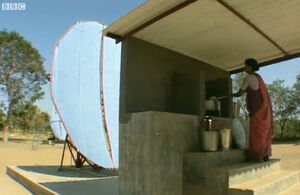
Watch BBC video: How solar stoves cut cooking smoke.
- Global Bid to Tackle Cooking Smoke US Secretary of State, Hillary Clinton has announced a global partnership to tackle the scourge of toxic smoke from indoor cooking fires. Cooking smoke is estimated to shorten the lives of 1.9 million people a year; it also contributes to climate change. The Global Alliance for Clean Cookstoves is a partnership between the US government and other nations along with charitable foundations. It is believed to be the first major attempt to tackle the issue worldwide. The project will attempt to build on national programs already underway in India, Mexico and Peru. It aims to introduce modern low-pollution stoves to the homes of 100 million poor people by 2020. Clean stoves run on biomass (with chimneys and clean-burn mechanisms), or gas, or on solar power. Watch BBC video: How solar stoves cut cooking smoke.
- Apply for a Partnership for Clean Indoor Air (PICA) award. Gain global recognition for your program's innovative approaches and outstanding results. Entry deadline is November 22, 2010, and awards are to be presented during the 5th Biennial PCIA Forum in Lima, Peru. Apply for an award.

SolSource 3-in-1 in use with Himalayan community members.
- The SolSource solar oven wins 500K EU in the Green Challenge. Once again the SolSource 3-in-1 has impressed the jury, and won the Dutch, Postcode Lottery Green Challenge. The Postcode Lottery Green Challenge award is a startup competition run by the Dutch Postcode Lottery with 500,000 EU ($666,200 US) up for grabs for the winner and 200,000 EU ($260,500 US) for the runner-up. All entries must have the potential to reduce greenhouse-gas emissions in a measurable fashion. From an impressive field of young entrepreneurs, the jury chose 25-year old Scot Frank of One Earth Designs as the winner for his company’s SolSource solar oven. The SolSource 3-in-1 combination is a solar cooker, heater, and electricity generator. It was inspired by the time Frabj spent in the Himalayas (the product has been tested there for 3 years), where women spend many hours a day collecting dung and wood fuels for cooking and heating. This process leads to deforestation, and many tribes in the Himalayas are rapidly running out of their traditional fuel sources. Families also breathe toxic indoor air pollution from the fire. Indoor air pollution is one of the world’s biggest killers of children under five, claiming 1.6 million lives per year. More Information...

Indonesian students with their solar cookers.
- Indonesia: Difficulties faced by rural folk in getting cooking gas supply has inspired Universiti Malaysia Sabah (UMS) students to create solar cookers as an alternative to traditional cooking methods.

Ron Mutebi demonstrates a Global Sun Oven in Uganda
- Businessman in Chicago Launches Solar Ovens in Uganda An immigrant from Uganda, now residing in Chicago, USA, has used the first portion of a $100,000 business competition prize to begin setting up an operation in his homeland to produce and distribute solar ovens. Ron Mutebi won his prize at the African Diaspora Marketplace competition in Washington in January. Mutebi arranged to ship from Chicago the components for 365 solar ovens and tools to assemble them in July. The shipment is scheduled to arrive in Uganda in October. In November, Mutebi will travel to Uganda to oversee the completion of an assembly plant and the training of staff to produce, distribute and service the cookers, made by Sun Ovens International in Elgin, Illinois. The ovens will appear in Ugandan markets in January 2011.
August 2010
- Solar cooking "Avon Ladies" in Zambia - The Solar Health and Education Project (SHEP) began in 2007 to fund solar cooking workshops in rural areas of Zambia, and also with the urban poor in the Livingstone area. The main goal of the workshops was to introduce solar cooking methods to the community in a sustainable fashion. Most at the workshop have little education, but are completely sold on harvesting the sun for their daily needs of cooking fuel. The team, with direction from Alison Curtis, developed a system to appoint a local leader at the workshop to follow-up with a group of participants to help and encourage using the new cookers. Now, three years later, the solar team has ten excellent leaders who take turns spreading the solar news by setting up at shows, events, museum gatherings, school playgrounds, clinics and so on. These unschooled women leaders have learned to fill in a simple form, which SHEP developed with their input, so they have the knowledge to complete a request for funds themselves. The headmaster at the nursery school reads these requests and grants the money from SHEP to hold the demonstration or workshop. The women do the shopping, keep receipts, hold the event and then fill in a very basic report. They are paid for their workshop day @ $2.00 per event. The women are quite resourceful, as they have learned to make Cookits from cartons and reflective Crisp wrappers found in the trash.
- Solar Cooking in Africa - A Remarkable Technology Transfer
- none|400px
- Solar Cookers for Africa: Solar Caravan 2010 - SunFire Solutions is an NGO in South Africa that has partnered with Solar Cookers for Africa to create the Caravan as a way to reach the portions of the population that live in areas typically difficult to reach. It will be a convoy of knowledge, experience, and partnerships in the area of sustainable household and community technologies and practices. The Caravan will start in Mozambique, to eventually cover most of Southern Africa. Far from relying in the knowledge and resources of a few, the Caravan will link experts, product suppliers, communities and funders. Starting in August 2010, a core team of 4 people from 3 countries will start traveling from Johannesburg, South Africa, towards Beira, Mozambique. In each community the Caravan visits, its members will be presented with a flexible curriculum of applied introductory workshops and demonstrations about the core topics and technologies. One fixed workshop module concerns clean energy; another food security, waste management and nutrition. To learn more, see how your experience may be of value, and offer to financial support see: Solar Cookers for Africa: Solar Caravan 2010
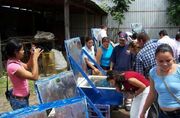
The Solar Women of Totogalpa demonstrate their solar cookers.
July 2010
- Nicaraguans Swap Firewood and Fossil Fuels for Solar Energy - Latin American Herald Tribune
- The Solar Women of Totogalpa is the name of a cooperative made up of 19 women and a man who are working to promote, produce and do research on renewable energy in the northern province of Madriz, Nicaragua, for the sustainable development of the family and the community. They have been involved in their community for quite a while helping to promote energy production in areas with no traditional source of electricity. Early emphasis was primarily with photo voltaic solar panel installation. After some time, the women agreed that they thought the solar ovens were more a priority, as even with electricity, they were still cooking with wood stoves. Saving the forested areas and smoke elimination while cooking were deemed more important for community health.
.
- Save the date! Solar Cookers International invites you to attend Shine On! 2010 celebration to be held Wednesday, August 25, 2010 at 5:30 - 8:00 pm at the Sierra 2 Center, 2791 24th St., Sacramento, CA. Guest speaker is Bob Christopherson whose expertise is in geography, with strong interests in polar regions, global climate change, energy issues, and environmental awareness. Music will be by Bob Wren and the Sacramento City College World Music Ensemble.
June 2010

Solar Cookers International board member Pat McArdle's novel about solar cooking in Afghanistan wins Amazon's Breakthrough Novel Award!
May 2010
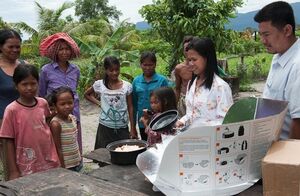
- A pilot project has begun in Tamoung Pha-em, Cambodia to introduce CooKit solar cookers to the local community. Similar to many other regions, residents have relied on wood for cooking. The area once surrounded by jungle, has mostly been turned into palm oil fields, leaving scarce wood for cooking. Families have started to rely on kerosene, or walk long distances to get wood. The project is sponsored by Global Roots, a Washington state non-profit. Patrick Firouzian recently traveled to Tamoung Pha-em with the first cooker to demonstrate it's potential. Dany Pan, a village school teacher, will use the cooker regularly and experiment to adapt local food recipes.
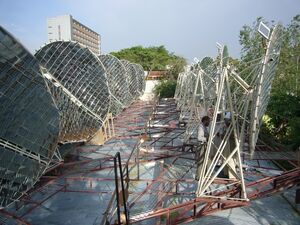
Scheffler Community Kitchen array at the Jamhuriat High School for Girls in Kabul, Afghanistan
- A Scheffler Community Kitchen is currently being installed at the Jamhuriat High School for Girls in Afghanistan through the efforts of Solare Brücke. Located in the heart of Kabul, it is planned to be operational in June. The school has an enrollment of 1000 girls and the new kitchen will serve approximately 700 students who have lunch at the school each day. Everyone there looks forward to stop using the wood-fired kitchen stove, and are quite proud that the entire new solar kitchen has been produced in Afghanistan.

Pat McArdle's solar cooking novel among Amazon finalists
- In solar cooking advocate Pat McArdle's novel, inspired by the year she spent in northern Afghanistan with the British Army, the fictional heroine introduces solar cooking to people living in remote villages in the Hindu Kush (just like Pat did when she was in Afghanistan). On Tuesday May 25, Amazon announced that Pat's novel is one of three finalists (out of 5,000 entries) in the General Fiction category of this year's Amazon Breakthrough Novel Award contest. The winner (who will receiving a publishing contract from Penguin Books) will be determined only by the number of votes received from Amazon customers before 11:59 p.m. EST on June 2. The publication of Farishta as a breakout work of popular fiction has the potential to expose millions of readers to sustainable solar cooking technology wrapped in a compelling plot with an international cast of characters. Read an excerpt and vote. If you are already an Amazon customer, voting takes less than one minute.
- Asian air pollution (partly from cooking fires) reached the US:
| none|300px | With a large ocean on either side of their countries, most North Americans do not consider the fact that the smoke from fuelwood burned in other countries can reach them. This video shows a cloud of carbon monixide migrating from Asia to the US. See Global dimming for more information. |
April 2010

SolSource 3-in-1 in use with Himalayan community members.
- SolSource 3-in-1 wins National Sustainable Design award. The SolSource 3-in-1 combination solar cooker, heater, and electricity generator being developed by Wellesley College, Harvard, MIT, and Qinghai Normal University students has won a P3 national award at the 6th annual National Sustainable Design Expo held at the National Mall in Washington, DC, on April 24-25, 2010. The Expo brings together students, scientists, engineers, and business leaders whose innovative technologies are designed to advance economic growth while reducing environmental impact. A highlight of the Expo was the technologies developed by P3 student teams to address alternative energy, purification and distribution of drinking water, reducing pesticide run-off, green buildings, and more. The student team is working to help bring clean energy to the rural Himalayas. The goal is to promote awareness about energy choices and to make clean energy device manufacture a feasible option for local income generation. They have been working with direction from the non-profit One Earth Designs.
- The April 2010 issue of Solar Cooker Review is now online.
- Afghan Scouts Harness Solar Energy - U.S. Army Soldiers are teaming with the Afghan Boy Scouts and Girls Scouts in Kabul, Afghanistan reducing the need to use wood as a fuel source. Through finding an alternate fuel source they are helping to create a cleaner Afghan environment while creating a more economical way of cooking. The solution: a solar oven, a box with a glass lid and reflective panels that absorb energy from the sun, trapping the energy inside the box to heat food and water. Solar ovens can bake, fry or steam any type of food. More Information
March 2010

Mexican teens constructing solar ovens to power their school's hot lunch program.
- Mexican teens have constructed their own solar ovens for the school hot lunch program. Utilizing the enthusiastic energy of teens, Peter Edmunds is introducing a solar-powered school hot lunch program into an economically disadvantaged Mexican middle school. The dream that the dusty border town of Palomas will become "the most solar-conscious town in Mexico" is closer to reality with four student-constructed solar ovens in place and in use. Edmunds, 71, a New Mexican retiree, founded the nonprofit organization Border Partners last year to address poverty in the desolate US-Mexico border area of Columbus, NM and Palomas, Mexico. Teens construct solar ovens
right|300px
- The world's largest solar cooking system was recently put into service. It is located in the holy town of Shirdi, India. Feeding the pilgrims that make an annual visit to the town has historically been done with conventional ovens, with recurring issues of fuel supply and air quality. Through the efforts and engineering of Deepak Gadhia and his wife, Shirin Gadhia, they have brought this largest solar cooking installation constructed to date, to Shirdi. They began working on the design in Germany before bringing the technology to India. Deepak is a specialist in energy conservation and management, and Shirin has a doctorate in genetic engineering. They worked with the proven designs of of the Scheffler parabolic solar oven as the basis for their system. The array incorporates seventy-three large parabolic dishes connected and coordinated with a tracking system to efficiently create the steam for cooking. Talking with CNN correspondent Mallika Kapur, Deepak said that "We soon realized what India needed was appropriate technology, not high technology". This region in India benefits from approximately 320 sunny days per year. During the monsoon season the existing boiler is used for cooking for the few days without sunshine.
- Video showing hundreds of CooKits in use at the Touloum Refugee Camp in Chad.
- 305px|none|
February 2010

- February 25, 2010: With hundreds of thousands of Haitians homeless and living in tent camps, Sun Ovens International is continuing to place as many ovens in camps as possible. In late February, Paul Munsen traveled to Haiti and initiated distribution and training in seven tent camps. A committee was formed in each camp to determine who would receive the Sun Ovens and look for ways to increase utilization. At each location many people who were not able to receive a Sun Ovens pleaded for additional ovens. For additional information about Sun Ovens International's work in Haiti, click here. As shown in the photos below, camps are in open fields, schoolyards or anywhere space is available. Previously trained staff from Programme Energie Solaire of the Free Methodist Inland Mission have been employed to conduct training sessions. Paul Munsen loaded his rental car with ovens to take to the camps where he met with a camp committees. Training on the use of WAPIs for water pasteurization was also provided. Children and adults were eager to learn how to cook with the sun. See more photos.
- Helping Haiti: Donate $40 to Solar Cookers International's (SCI) Haiti Project to quickly put a solar cooking kit (CooKit, pot, and WAPI) into the hands of a Haitian family affected by the recent devastating earthquake. SC) is partnering with Sun Ovens International and Friends of Haiti Organization to send as many solar cookers as possible to Haiti in a shipping container leaving on March 25, 2010. Donate here!
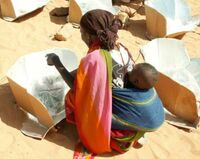
Darfur refugees cooking with CooKits at the Touloum Refugee Camp in Chad
- Evaluation report from a November 2009 on site visit to the Touloum Refugee Camp shows strong uptake of solar cooking by refugee families.
- February 15: Haiti update: Jack Anderson reports: Paul Munsen is going to Port-au-Prince next week to establish some connections with the Free Methodists and others. There could be as many as 80 Sun Ovens there that didn't get crushed or damaged. Right now I am trying to connect with experienced trainers that might take jobs in any of the projects that surface. So it is a planning and capacity building phase that we are in. The energy, consciousness and cooperation among all of our solar colleagues is very inspiring and somewhat humbling in the face of such a huge catastrophe.
January 2010
- Cooking with the power of the sun - Deutsche Welle
- Solar ovens "cooking up a storm" for quake victims in Petite Riviere De Nippes, Haiti.
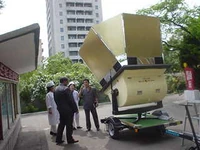
The Villager Sun Oven can cook large amounts of food.
- January 29: Sun Ovens International Update: Much progress has been made in the efforts to expand the use of Sun Ovens to Haiti. On January 28, 2010, 2 large Villager Sun Ovens, 160 Global Sun Ovens, 200 CooKits and 2,000 Water Pasteurization Indicators (WAPIs) have been shipped. In addition, arrangements are underway for 297 Haitian made Global Sun Ovens from the assembly plant in Lambert Haiti to be distributed to families left homeless by the recent earthquake. A shipment of parts to reopen the assembly plant is scheduled for February 8. A partnership has been initiated with Bright Hope International, an NGO which has been working in Haiti for more than 15 years. The majority of the Sun Ovens will be distributed to families living in a tent city which has sprung up at a garbage dump in Port au Prince. Bright Hope is currently providing food and medicine to 429 families at this location. Some of the ovens will also be used in tent cities in Pignon which is 79 miles north of Port-au-Prince and has doubled in size from 35,000 to 65,000 people in the past two weeks. Paul Munsen will be traveling to Haiti in early February to assist in the distribution and training. Bright Hope plans to send additional shipments to Haiti of food, medicine and Sun Ovens throughout the month of February. With hundreds of thousands of Haitians homeless and living in make shift tent camps the need for Sun Ovens is immense. Most of the tent camps and are using charcoal to cook. The smoke in these camps strains the health of women and children who are all ready malnourished and dehydrated. The cost of each Sun Oven with two pots and WAPIs is $199. Donations of any amount will be greatly appreciated. Donations should be made out to Friends of Haiti Organization, PO Box 222, Holland, OH 43528, USA (Please note the donation is for the Sun Oven project.)
- Water Pasteurization Indicators set to go to Haiti - Recorder Online
- Kevin Adair discussed solar cookers and help for Haiti on Chicago Public Radio's Worldview program on Thursday, January 21. Listen on-demand here.
- Solar Cookers Head to Haiti (Audio) - Capital Public Radio
- Solar Salvation for Haiti? - MSNBC
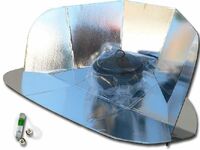
Helping Haiti: Support the January 28th shipment of 200 solar oven kits to Haiti. Donate here!
- Helping Haiti: Donate $40 to SCI's Haiti Project to quickly put a solar cooking kit (CooKit, pot, and WAPI) into the hands of a Haitian family affected by the recent devastating earthquake. Solar Cookers International (SCI) is partnering with Sun Ovens International and Friends of Haiti Organization (FOHO) to send as many solar cookers as possible to Haiti in a shipping container leaving on January 28, 2010. There is room in the January container for 200 extra solar cooking kits along with Global Sun Ovens from Sun Ovens International and 270,000 meals being provided by Feed My Starving Children (donations also accepted here). Other shipping containers will follow. You can also support the work of other NGOs promoting solar cooking in Haiti by going to our Haiti page.
- Issue #22 of the PCIA Bulletin from the Partnership for Clean Indoor Air is dedicated to the role that solar cooking can play in reducing indoor air pollution.
- The November 2009 edition of Solar Cooker Review is now online.
December 2009
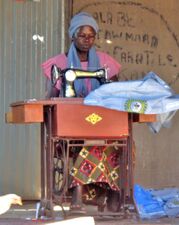
Deborah Dao has time to pursue her sewing business while her solar cooker is cooking her family's meals.
- December 2009: Emancipated from the Smoky Kitchen by the Power of the Sun. Deborah Dao cooks her family three square meals a day - a responsibility which in this economy requires nearly constant preparation and cooking. Most women spend all day pounding millet, mixing the batter, chopping firewood and fanning the flames to cook their family's toh, but here there is no burning hearth, no fire, no smoke. On a closer look, you can see that Deborah is cooking with a solar oven - a wonderful appliance made by local carpenters with their own wood and just a few imported materials which harnesses solar radiation to collect heat energy.
- Audio interview with Lamin Sawo where he discusses AHEAD's large-scale solar cooking project in The Gambia where 900 families are now regularly using solar cookers to cope with rising food prices and government restrictions of cutting trees.
- Mali: Solar cooking revolutionizes womens' lives in the kitchen - Deutsche Welle
November 2009
- Solar Cooker System as “Most Meaningful Carbon Offset” Campaign Launched - Sacramento Press
- The holidays are fast approaching. As in years past, Solar Cookers International (SCI) wishes to encourage its members and supporters to consider alternative gift-giving, the practice of making a meaningful contribution to a worthy cause in lieu of a traditional present. There are many great reasons to engage in this form of giving, including: promoting altruism, mitigating the effects of the holidays on the environment, and emphasizing the true spirit of the season. A popular way of participating in alternative giving is to make a donation in someone else’s name. For this we offer gift cards personalized with a hand-written message of your choosing. And for those who prefer to buy something that can be unwrapped, there’s good news -¬ the proceeds from sales of our solar cooking products support our nonprofit work, and the gift recipients are introduced to the wonderful benefits of cooking with the sun! To place your holiday orders, please visit the SCI Marketplace or contact SCI Office Manager and Marketing Coordinator Sierra Scott at (916) 455-4499.
- Beyond Zero talks to Deepak Gadhia of Gadhia Solar (transcript, or audio)
- Solar cooking comes of age in Kenya - Al Jazeera
- New mobile solar bakery benefits the population of Méouane, Senegal (original in French) - Agence de Presse Sénégalaise (See also Solar restaurants and bakeries.)
- UN Environment Fund donates 140 solar cookers to the women of Ndoukoura, Senegal (French) - Agence de Presse Sénégalaise
- "Every [Indian] individual/household should have a solar cooker," says Arvind Virmani, Chief Economic Advisor, Ministry of Finance, Government of India. (Read interview) - Moneycontrol.com
- Beyond Zero Emissions interviews Wolfgang Scheffler: Audio and Transcript (Thousands of Scheffler Community Kitchens are now installed at hundreds of locations around the world. Wolfgang Scheffler has made his dish designs and associated intellectual property available for free to create a solar world.)
- A Reuters video shows an EcoAndina project in the village of Misa Rumi in Argentina where everything is powered by the sun. Pictured above is the town bakery where 5 kg of bread are cooked every hour.
October 2009
- The September 2009 issue of Solar Cookers World Network's newsletter is now online.
- Kenya: Entrepreneurs Cashing in on Green Campaign - Business Daily (Nairobi)
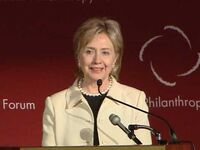
Hilary Clinton speaking at the Global Philanthropy Forum Conference 2009
- Hilary Clinton mentioned solar cooking in her remarks at the Global Philanthropy Forum Conference 2009: "...and women cooking meals over solar-powered stoves that produce less black carbon and soot. We see the cutting down of pollution and respiratory disease, and saving women from long trips to collect firewood, and save diminishing forests." (text, video)

Pat McArdle demonstrates solar cookers for disaster preparedness at the National Defense University in Washington, DC.
- Solar Cookers at the National Defense University - Digital Video and Imagery Distribution
September 2009

You can now donate solar cookers to offset your own carbon emissions.
- Solar Cookers International East Africa Office trainers traveled to the Kimilili District, Maeni Location, Kamusinde village of Kenya to train 36 community leaders involved with the Kamusinde Christian Community Based Organization in the use of solar cookers for cooking and water pasteurization.
- Solar Sport box cooker project launched in Uganda - All Africa.com
- The July 2009 issue of Solar Cooker Review is now online.
- Kiva is a website that connects individuals in developed countries with entrepreneurs in developing countries, facilitating person-to-person loans. If you are looking for funding for a solar cooking project, consider contacting the Kiva field partner in your country.
August 2009
- Indian government to increase funding for off grid solar power including solar cookers - Business Standard
- Former Peace Corps Volunteer Proposes Solar Cooker Project for Africa - U.S. News and World Report
- Senator Supports Solar Cookers in Darfur - The New Jersey Jewish News Senator Robert Menendez (D-NJ) says he will forward the results of President Obama's Special Envoy to Sudan General Scott Gration’s efforts to study and improve the efficacy of solar cookers, which, by reducing the need for women to leave refugee camps to gather firewood — where they are often attacked — can help decrease violence against them.
- Solar cookers' Shine On at Sierra 2 - Sacramento Press (Press report about the Shine On event organized by Solar Cookers International)
- Dr. Bob Metcalf gave a very informative interview to Kirk Hamilton PA-C, of http://www.prescription2000.com, an online resource that delivers credible nutrition research to health professionals and to the public. Listen here. There is also a transcript available.
- National Defense University Project that Aims to Help War Torn Nations Includes Solar Cooking as one of its Recommended Deployable Technologies - Office of the Secretary of Defense Public Affairs
- Make a Parabolic Solar Cooker from a Bamboo Papasan Chair - The UberReview--Gadgets and Wired Madness
- Parabolic Solar Barbecue in Canada - The Standard
- Cooking with the Sun in Colorado - Washington DC Examiner.com
- Build a Solar Cooker from old CDs - Tree Hugger
- Students create Salud del Sol to market solar cookers as autoclaves in Nicaragua - State Department Federal Credit Union Brass Magazine
- Solar Cookers Help Maasai Women in Southern Kenya Lift Up Africa Newsletter Solar Cookers International and Lift Up Africa Form Partnership to bring solar cooking and retained heat cooking to Maasai women.
- Minnesota Solar Ovens Help Feed the World's Hungry - CBS TV Affiliate WCCO Since 1988 the Solar Oven Society SOS Has Delivered Thousands of Solar Ovens Around the World.
- India's Largest Solar Cooker - Green Muze
July 2009
- CBS TV coverage viewable online: Solar cooking gaining in popularity and Sharon Cousins is championing the cause
- Solar Cookers International's Annual Report for 2008 is now available online.
- Solar cookers were featured on Good Morning America on July 29, 2009. Watch here.
- Solar Cookers International is now on Twitter.
- Solar Cookers International's annual Shine On event is fast approaching. Save the date: Wednesday, August 26th. This year's Shine On will be at Sacramento's Sierra 2 Center. Our featured speakers will be Dr. Bob Metcalf, who will give an update on the SCI Safe Water Project and Elaine Corn, Sacramento Bee food critic and Capital Public Radio personality. At last year's "Celebrating New Directions" Shine On we hosted 225 people who heard speakers, including Dr. Metcalf, talk about our recent successes and exciting new plans. Dr. Metcalf also showed off SCI's Portable Microbiology Laboratory (PML). Our guests feasted on hot dogs, veggies, and an array of delicious solar-baked desserts. We hope to see you again this year. Remember: Wednesday, August 26, 5:30 p.m. at the Sierra 2 Center, 2791 24th Street in Sacramento, California.
- Keep on the Sunny Side with a Solar Cooker - Cruising World (Boating family cruises off the Pacific coast of Mexico and cooks tamale pie with a solar HotPot)
- Saving the World One Falafel Ball at a Time - Huffington Post (Chefs learn to fry falafel balls in a parabolic solar cooker just before sunset)
- Solar Fueled Cookup A Hit - Stabroek News Georgetown (Guyanese observers and media were astounded to see that the cardboard and aluminum foil Cookit was able to cook a local chicken and rice dish in two hours using only sunlight.)
- Backyard BBQ with Sunshine - Mother Nature Network (After all the veggie dogs are scarfed, do backyard BBQs leave you with a not-so-green taste in your mouth? Give a solar oven a try.)
- Sun In the Oven - www.publicservice.co.uk. Karyn Ellis, Director of International Program Development at Solar Cookers International, explains how solar power can tackle disease.
- Economic Survey urges Indian Government to eliminate cooking fuel/kerosene subsidies and ensure rural households have a solar cooker and a solar lantern - The Hindu, Business Times
- Discovery Channel Global Catastrophe Survival Series Participants Will Build Solar Cookers - Examiner.com
June 2009
- Utah Cooking Event Shines Spotlight on Solar Cooking - Salt Lake Tribune
- St. Petersburg Man grills in the backyard with a solar box cooker - 10 Connects.com
- Dan and Denise Rojas build a glass solar oven with scrap materials - DIY Solar Systems
- Ohio Engineering Students Build Solar Cookits and parabolic cookers for Africa - Mansfield News Journal
- New Jersey Governor Jon Corzine commends high school students for sending solar cookers to Darfur - Politicker New Jersey
- Carbon Trade and Solar Cookers Benefit Farmers in NW China - China View. Poor Chinese farmers are benefitting from the Clean Development Mechanism (CDM), a global initiative to reduce greenhouse gases. CDM is an arrangement under the Kyoto Protocol that allows industrialized nations to support projects to reduce emissions in developing nations as an alternative to more expensive projects at home. This CDM project is jointly conducted by a Ningxia-based company and the Environmental Center of Beijing-based Tsinghua University. Ningxia Fenglian Co. Ltd. will send out 120,000 free solar cookers to poor farmers in south Ningxia in 2009 and 2011.
- The Rotary Club of Jackson, California won gold with their international Integrated Solar Cooking Project during the 2009 Rotary District Conference of District 5190 in Reno. Teaching the Teachers" in Brazil during 12 weeks in 2008 was a succes. Their team held 12 hands-on workshop, teaching not only how to cook and pasteurize water with solar energy, but also how to make the solar cookers, rocket stoves and hay baskets (all elements of the Integrated Cooking Method). As a result in Brazil there is a team of 16 students perfectly able to teach how to use and make the solar cooking devices.
- Wellesley College senior wins $75,000 environmental prize - Wicked Local Welsley. In collaboration with Tibetan villagers and students from MIT,Wellesley senior Caitlin Powers created SolSource 3-in-1, an innovative solar cooker that also generates heat and electricity. The design, which won an additional $6,000 from the Clinton Global Initiative this month, is made from local resources.
May 2009
- Fighting Pneumonia - New York Times
- Google execs invite solar cooking NGOs to Mountain View campus for Earth Day event
- The March 2009 issue of Solar Cooker Review is now online.
April 2009
- How you can really use the power of the sun to cook - ABC TV - Phoenix (Jackie Harsha got 8 minutes on a popular Phoenix morning TV show to demonstrate the benefits of solar cooking. Video available online.)
- Solar energy cookers catch on - The Standard (Nairobi)
- Third-World Stove Soot Is Target in Climate Fight - New York Times (Includes discussion of solar cookers and fuel efficient stoves.)
- Solar Serve receives two awards in the 14th Creative Awards for Science and Technology Vietnam. Ceremony broadcast on Vietnamese national television.
300px|left
- SolarCycle, based at Brown University, Providence, RI, has developed a technology to convert waste plastic bags into panels that are then lined with reflective material from the inside of potato chip bags. They have also developed a trough-based water pasteurizer that can pasteurize 1000 liters of water per day. Micro-credit will be used to make these technologies affordable for the poor. Read more...

National Geographic Video covers the work of Solar Cookers International and others.
- Solar Cookers World Network (SCWNet) launches Canada/USA/Europe regional network.
- Inventor turns cardboard boxes into eco-friendly oven - CNN (Solar Cookers International alerted CNN that this invention is not new. CNN then updated the story to mention the work of SCI and others.)
- A stove powered by the sun is making a big difference in impoverished communities - National Geographic Video
- Featured article: Promoting solar cooking in Afghanistan - In early 2009, Patricia McArdle was contacted by a large international agency about the possibility of providing large numbers of solar cookers for the population of Afghanistan. She set about gathering the advice of promotors with deep solar cooking experience in Afghanistan. This article details the results of her investigation.
March 2009
- Lighting the way – Selco India - Financial Times
- How are solar cookers saving lives in Chad and Darfur? - HowStuffWorks
- The five fighters of climate change - Financial Times
- Featured article: Use these easy-to-remember shortcuts when sending links to people pointing to important articles on this wiki.
- Charcoal use burns up Africa's forests (Audio also available here) - Marketplace (NPR)
- Donate to solar cooking project online: Solar Cooking to Help Women Affected by War in El Salvador - Solar Household Energy
- The Sabor Solar Cookbook from Grupo Fenix shows how to cook Nicaraguan foods in a solar cooker. (Spanish version also available.)
- Simple Tool That Saves Women's Lives - Parade Magazine
- Shop online at GoodShop.com and a percentage of each purchase will be donated to support Solar Cookers International's work! More than 600 top stores are participating including Amazon, Target, Staples, Best Buy, and more!
February 2009
Video:Sun Scoop
- Featured article: The Sun Scoop, designed by Stephen Harrigan, is a light weight box type solar cooker. This waterproof cooker is made from plastic flute board (just like corrugated cardboard, but made of plastic). Large enough to accomodate multiple cooking pots, the Sun Scoop is designed to be manufactured in simple workshops in developing countries. It has a simple glass door with inner tube for the seal and hinges and clasps that are simple to make and easily replaced if broken. Snaps open and adjusts for the angle of the sun. No need to tip the cooker or have the food on a swinging tray.
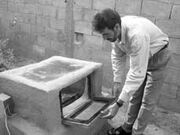
"What you need is 15 cement bricks, mud mixed with straw and two sheets of glass," said Abu Tawahina.
- Some Palestinians turn to solar cooking during Gaza siege - IslamOnline.net
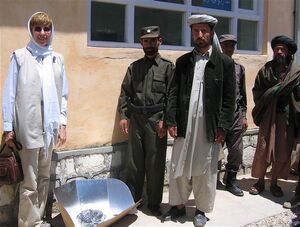
Patricia McArdle demonstrating her homemade CooKit to the governor, chief of police and villagers of Marmol in Balkh Province, Northern Afghanistan in March 2005
- Audio interview with Patricia McArdle: After learning how to build solar cookers from plans downloaded from the Solar Cooking Archive during her service with the US State Department in Afghanistan, Patricia McArdle has taken on the task of moving solar cooking into the mainstream in US Government development agencies. This wide-ranging interview takes us through her successes and disappointments in this effort. Patricia also discusses her recent trips to Nepal where she demonstrated the HotPot solar cooker in remote villages, and India, where she attended two important conferences. Listen to this interview on Calling All Solar Cookers.
- Villagers go solar - Tuoi Tre (Covers recent work of Vietnam Solar Serve.)
- These cooks busiest when sun is shining - San Diego Union-Tribune (Discusses the San Diego Solar Cooking Club.)
- Just a note to remind everyone that we have discussion forum as a companion to this site: http://solarcooking.org/phpBB2/index.php
- Featured article: Cooking for large groups
- Sun Worship and Self Reliance from the blog HIV in Kenya.
January 2009
- Video: At the 2009 ETHOS Conference Dale Andreatta spoke about water pasteurization, the development of the WAPI (a simple device for determining whether water has been heated to a temperature that makes it safe to drink), flow-through water pasteurization devices, and strategies to pasteurize water with the waste heat from a wood-burning cookstove (Embedded video on right. Direct link to video here.).
- The Chad Government's ban on charcoal and fresh cut fire wood in N'djamena creates 'explosive' fuel shortage crisis in city: Here's what's happening in N'djamena this week after the charcoal ban went into effect: "'As we speak women and children are on the outskirts of N'djamena scavenging for dead branches, cow dung or the occasional scrap of charcoal,' Merlin Totinon Ngutan, head of the UN Human Settlements Programme (HABITAT) in Chad, told IRIN from the capital. 'People cannot cook. Women giving birth cannot even find a bit of charcoal to heat water for washing,' Mrs. Narmadji, with the Association of Women for Development in Chad, told IRIN." (Source: Banging pots and pans to end charcoal ban - allAfrica.com)
- Upcoming event: March 1-3, 2009: Workshop on Entrepreneurship in Renewable Energy" with special emphasis on manufacturing parabolic solar cookers in Dhule, India. More information...
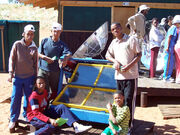
Peace Corps volunteer and friends bake bread in Nadeet, Namibia.
- Miriam Kashia reports that in their training 60 recent Peace Corps volunteers were provided with solar cookers manufactured in Namibia. They each took these to their villages for use there. More information.
- The November 2008 issue of Solar Cooker Review is now online.
- Reader's Digest has awarded a $10,000 grant to Jewish World Watch for its landmark Solar Cooker Project.

